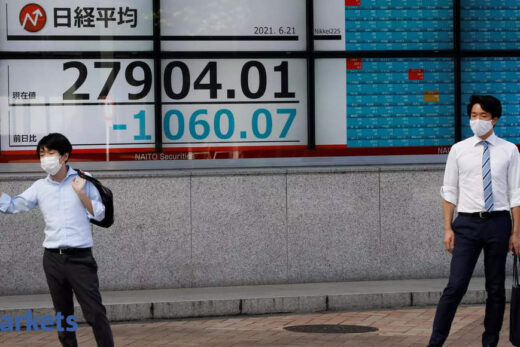Can I quote your favourite line, that bull markets are born on pessimism, grow on scepticism, mature on optimism and die on euphoria?
I do not think these are my words. I think these are the John Templeton. But what he is saying is absolutely right.
If this bull market is a journey from Churchgate to Borivali, where do you think this bull market has reached?
I would say Charni Road.
So it has a long, long way to go?
Yes.
Do you see the potential of a kind of raging bull market in India like we saw in America last decade?
America has a bull market from 1981. What has happened is only correction. It is not bull and bear markets. India has the lowest rate of corporate profits to GDP. We have very low exposure to equity. We have the institutions to channelise equity investment plus we are in a phase where the Indian economy is going to grow in double digits for lots of time to come. I do not see why we could have severe corrections within the bull markets. But we are not going to have reversals. This bull market is going to last for a good period of time.
Nikunj Dalmia: You fondly shared with us that market price is a function of PE into EPS. Do you think much of the PE expansion for Indian markets has happened and now it is EPS?
Rakesh Jhunjhunwala: I would not say it happened for a market. It has happened for the large caps and especially for the largecaps favoured by the FIIs, it has surely happened, the valuation parameters. There is a large part of the market where there is a lot of scope both for earnings growth and for EPS expansion and that is where the greatest returns will come.
Which are the pockets where the PE expansion cannot happen? Are these the obvious names like consumer, consumer staples, consumer durables?
Yes, I would think that companies which were valued at or over 50 times earnings. Temporarily it could expand but even if I look at it for the next 10 years, I do not see multiples of more than 50 on a sustainable basis. On an average for any stock to be valued at greater than 50 times earnings is not easy for prolonged periods of time.
Why are you extremely bullish on metals?
I think the commodity cycle has turned and the valuation of some of the metal stocks is a joke. Look at cement and steel. Shree Cement is 40 times earnings and
is expensive at six times earnings! There is going to be a very big upsurge in the steel cycle and in other commodity cycles that is why I am so bullish and they are ridiculously valued.
The definition of a commodity bull and a bear market is that when there is a bull market in commodity, commodity producers make money; when there is a bear market in the commodity, commodity consumers make money. Your view?
I do not agree with you because as societies are getting more service oriented, the cost component of metals in daily consumption is coming down. In America, if you drink a coffee for $3 dollars, the coffee in it is three cents. So, I do not think that consumers are going to lose if commodity prices go up and whoever loses or wins, it is a natural product of economics.
If the returns are lower than cost of capital, then no fresh capacities will come up. The more mankind develops the usage and requirement of commodities just goes up.
In 2018 you had said that the best thing that has happened to the Tata Group is that N Chandra has become the chairman and after that what a comeback it has been in all the Tata Group of companies. What is the way forward for Tata Group and Tata Group of companies now?
We are still underestimating the kind of profitability and return to shareholders the Tata Group is going to give under Mr Chandra’s leadership. He is an exemplary thinker, understands technology. Has the right temperament, humility and knows governance. The house of Tatas is blessed by God. In every company other than TCS, they have less than 50% shareholding. In TCS they have 70%. I am very bullish and the Tata Group today is a very-very large component of my portfolio and I hope to keep it that way.
Is it a coincidence?
It is a coincidence. I buy shares of companies. I do not buy shares of any groups. But ever since Mr Chandra took over and ever since I understood him and what he is trying to do, I got extremely bullish. The first stage is always uncertain. Now that we have passed that stage, we are going to catch speed.
Do you think in this decade, there could be an incremental change in the way the Tatas are doing business?
What Chandra has changed will last for years. He has brought about consumer centricity. He has brought emphasis on cash flows. He looks at cash flows and not EBITDAs and profits. Also, his knowledge of technology has enabled him to impute that into each company. There is the idea of synchronisation. He is a measured risk taker, Also, there is boldness and commitment. He had to pay Rs 38,000 crore for Tata Communication and he never blinked.
I have the deepest respect for him for what he has done for the Tata Group. He has helped me to be a rich man for which I will remain thankful forever.
Which are the three Tata Group companies which are not on the verge of incremental change in this decade?
He has changed Tata Consumer Products. Tata Motors he is changing. The most surprising upside in the Tata Group according to me, will come in Tata Motors. There is going to be change in everything; in approach, in volumes. His idea is let us do something which will have size; otherwise let us not do it. I think the change will be throughout the Tata Group.
There are two types of naysayers in the market; one, those who are worried about inflation and second who are worried about valuations. How realistic should one be about a fear of inflation coming back?
For a country like India, 4-6% inflation is healthy and good and I do not see inflation beyond that point in India.
Even globally?
The world is a mystery. I asked Mr Raghuram Rajan also. Japan has done the biggest money printing in the world but inflation just does not come there.
Why is that happening?
Nobody has an answer. One is because according to me efficiency is coming. Second is because when the number of consumers do not go up. It is demographically linked. It is the biggest mystery of the world. I think if the 10-year bond is to trade at 2%, then a 50 PE in America is justified. Therefore, it is very difficult to predict why.
Are you not worried about the spike in crude price? It is suddenly $60 plus. Could that change dynamics for us?
A part of it is because of temporary reasons. It is very cold in America, this being winter and at some price, the shale oil production will come back. It is an artificially suppressed price. I see oil prices between $60 and $70. I do not see it beyond that.
So your bull market thesis will not get punctured even if oil stays in and around $60.
Even at $70, what is the problem?
You have always said that bull markets never die of age, they only die when the central bank does something. Is that the first indicator which we should look at? It is not going to be PE multiples or something else?
No, bull markets die for two reasons; when the upswing in corporate profits ends and there is extreme participation by people. Even if profits spike very badly and do not repeat themselves, if there is no participation by the public or there is no over commitment, then markets do not end easily.
There has to be a combination of profitable growth being lesser than what is expected combined with an extreme belief and commitment in the market. Just as people today are looking for bearishness, when it reaches a stage, people will look just for bullishness. That is the point at which a bull market reverses into a bear market.
What is your view on internet companies? A lot of internet companies in India will go public in the next 12 to 18 months. There could be Nykaa, policybazaar. Nazara could go public. What is your view there?
At what valuation I buy is important for me. I would not like to pay much money for companies who have perceived large markets and good positioning in that market but no cash or very little cash flows. You are discounting a large part of the future into the present. Think of Uber. After going public, it never went up. Personally, I am not a very favoured investor of internet companies. But people have made money. Good luck to them.
What about IT services? There has been a reboot for TCS and Infosys kind of business. Do you think Indian IT companies deserve to trade at high PE multiples now?
Why not and who am I to decide their multiples? But I can tell you one thing that strategically the value of the Indian IT industry to India and the world is invaluable because I do not see any nation in the world being able to compete with Indian IT services. In maybe six years, it is going to be a half-a-trillion-dollar business. Indian IT industry is going to be the world leader for a long time to come.
Do you see a 10% growth for a long time?
Growth could be 8%, growth could be 12%, growth could be 15% but there is going to be growth.



